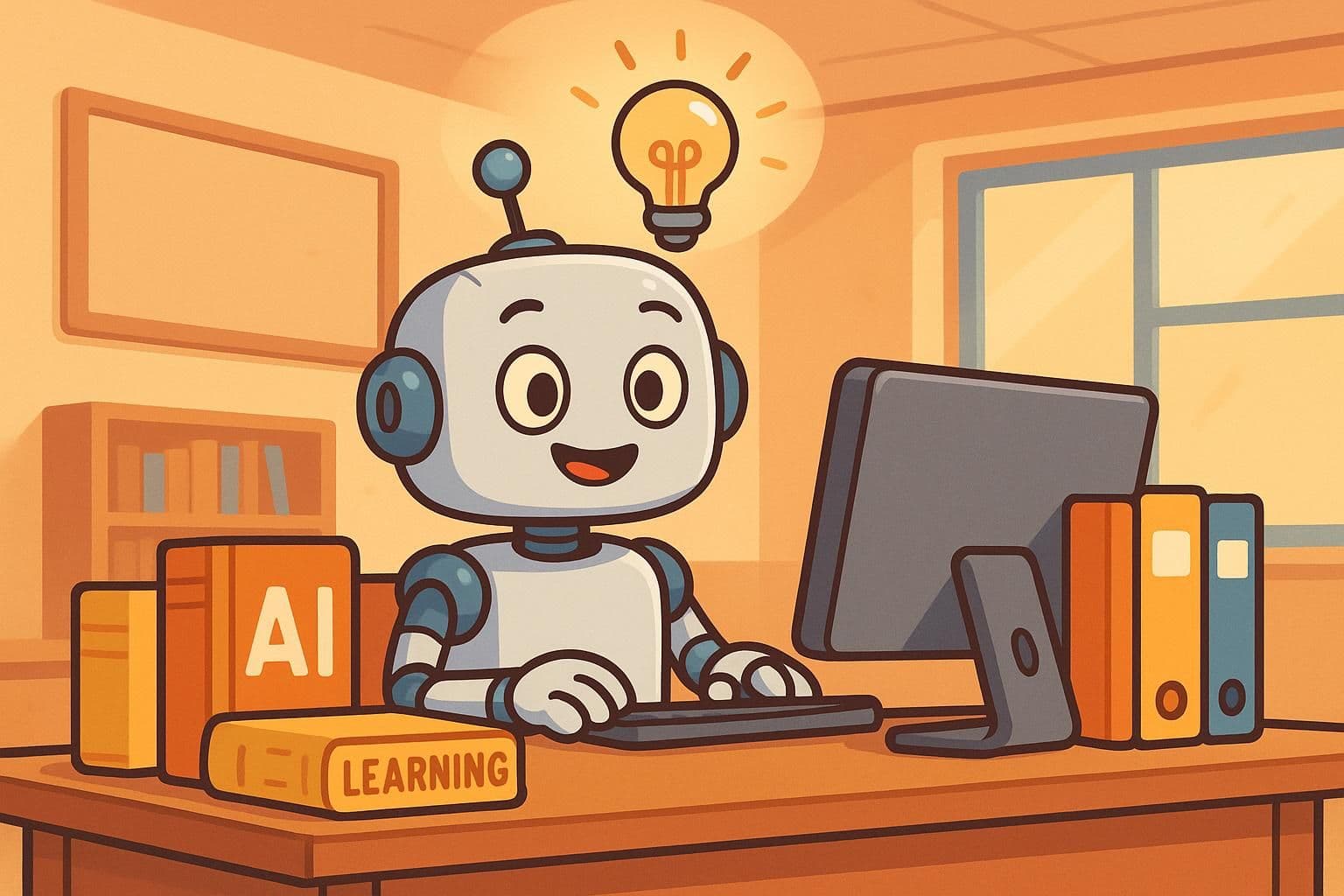Best Free AI Agent Courses: Learn to Build Intelligent Agents
Explore top free courses to master AI agent development, from hands-on projects to certifications, catering to all skill levels.

AI agents are transforming industries by automating tasks like customer support, data handling, and decision-making. For professionals eager to gain relevant skills, free AI agent courses offer a practical way to get started. These programs cater to various skill levels, from beginners to experienced developers, and focus on building functional systems that solve real problems. Below, we explore five standout options, including their strengths, learning formats, and career benefits. Whether you're new to AI or looking to enhance your expertise, these courses can help you meet the growing demand for automation skills.
Building AI Agents from Scratch | Full Course
1. Hugging Face AI Agents Course
Hugging Face offers a free AI agents course that blends in-depth theory with practical, hands-on projects, making it ideal for those looking to build real-world automation solutions.
Curriculum Overview
The course is structured into progressive units, starting with the basics and advancing to complex implementations. The initial unit lays the groundwork by exploring key concepts like reasoning frameworks, decision-making strategies, and multi-agent system design. This foundational module is designed for self-paced learning, allowing participants to revisit challenging sections as needed. The theoretical insights gained here naturally lead into the course’s practical applications, ensuring a well-rounded learning experience.
Practical Learning Through Projects
One of the standout features of this course is its emphasis on hands-on learning. Participants engage in project-based tasks, building multiple functional agents throughout the program. These projects not only strengthen understanding of the theoretical material but also help learners develop a portfolio of practical work. This approach ensures students gain skills they can immediately apply to automation challenges in professional settings.
Certification Options
The course offers two certifications to recognize achievement. Completing the first unit earns a "certification for fundamentals", while finishing the entire program, including a use case assignment and final challenge, awards a "certificate of completion" [1]. Both certifications are free and flexible, with no deadlines. However, many industry professionals note that while certificates show dedication, a portfolio showcasing functional agents often carries more weight for career opportunities, particularly for entry-level roles [2].
Flexible Learning Format
Designed as a self-paced online course, the program accommodates working professionals and students alike. Its modular structure allows learners to move through the content at their own speed, revisiting complex topics as necessary. This flexibility aligns with the growing demand for accessible, on-demand learning in today’s fast-paced tech environment.
2. Google AI Training (Agent Development Modules)
Google offers free AI training modules that combine theoretical knowledge with practical, hands-on experience, making it easier for aspiring developers to dive into AI agent development. These modules are designed with real-world applications in mind, allowing learners to build relevant skills as they progress.
Curriculum Overview
The training starts with foundational AI concepts and gradually moves into more advanced topics. Each lesson builds upon the previous one, reinforcing key principles while introducing new material. What sets these modules apart is their interactive nature, moving beyond traditional lectures to include tools and activities that engage learners more effectively.
Interactive Learning Experience
The program emphasizes practical application through interactive exercises and project-based assignments. As learners advance, they get the chance to create functional AI agents, applying their growing knowledge to solve real problems. This hands-on approach ensures that concepts are not just learned but actively practiced.
Certificates and Career Readiness
Each completed module comes with a certificate, awarded based on assessments and project work. These certificates validate practical skills and demonstrate readiness for real-world AI agent development. This clear focus on practical outcomes helps learners prepare for roles in the evolving job market.
Flexible and Accessible Format
The modules are available online for free and are designed for self-paced learning. With cloud-based tools, there’s no need for specialized hardware, making the training accessible to anyone with an internet connection. Additionally, discussion forums provide opportunities for collaboration with peers and access to expert guidance, enhancing the overall learning experience.
3. OpenAI Academy AI Agent Learning Path
OpenAI offers a hands-on approach to learning AI agent development, focusing on practical skills rather than just theory. This learning path emphasizes coding and real-world applications using the OpenAI API.
Course Structure
The program starts with an introduction to machine learning basics and gradually advances to more complex techniques for creating intelligent agents. The curriculum is divided into step-by-step modules, ensuring learners build a strong grasp of AI concepts while also addressing ethical considerations in AI development. This structured approach ensures a solid mix of theory and practice.
Practical Experience
Participants get to work on coding exercises and projects directly tied to the OpenAI API. These projects allow learners to create functional AI agents that can be added to their portfolios, showcasing their ability to solve practical challenges and apply their skills in real-world scenarios.
Certification Benefits
The program also includes a certification process, which evaluates participants' abilities through practical assessments. Earning this certification demonstrates job-ready AI skills, making it a valuable addition to any professional profile.
Flexible Learning Options
The course is delivered through self-paced, cloud-based modules, eliminating the need for complex technical setup. Learners have access to detailed documentation, community forums, and scheduled help sessions for guidance. While the free tier covers essential development topics, some advanced modules may require additional API credits for full access.
sbb-itb-23997f1
4. The Ultimate AI Agency Masterclass (YouTube)
Information about The Ultimate AI Agency Masterclass is limited, but its structure and focus appear similar to other free AI agent courses available on YouTube. Below, key aspects of its curriculum, accessibility, and learning approach are explored to provide a clearer understanding of what it offers.
Curriculum Overview
The masterclass likely emphasizes practical, project-based learning, a hallmark of many YouTube courses on AI agent development. These courses often guide learners through hands-on projects, such as building basic AI agents, using step-by-step video tutorials. However, it remains unclear whether this masterclass delves into more advanced theoretical concepts or provides a deeper understanding of AI principles.
Accessibility and Format
One of the strengths of YouTube courses is their accessibility. All you need is an internet connection and a device with a web browser. The video format is user-friendly, allowing learners to pause, rewind, and skip to specific sections using timestamps, making it easy to revisit key points or focus on areas of interest.
Practical Learning Approach
This masterclass, like many on YouTube, encourages learners to follow along with the instructor in real-time, creating AI agents as they watch. Instead of structured assignments or formal feedback, learners assess their own progress, using the flexibility of video tools to guide their hands-on experience.
Certification Considerations
Free YouTube courses, including this one, typically do not provide formal certifications. While participants can gain practical skills and create portfolio-worthy projects, the lack of official credentials may limit their professional recognition. Despite this, the hands-on nature of the course can still be a valuable way to develop real-world skills in AI agent development.
5. Latenode Academy
Latenode Academy offers a specialized learning experience in AI agent development, using a professional-grade visual platform that reflects real-world business settings. Unlike many programs that lean heavily on theory, this academy emphasizes practical, hands-on education through scenarios businesses face daily.
Curriculum Overview
The curriculum covers everything from basic automation to advanced multi-agent systems, with each module building logically on the previous one. Students tackle projects designed to address real business needs, such as automating customer support, optimizing data workflows, or integrating CRM systems.
The content is regularly refreshed to include the latest AI advancements. Feedback from industry experts and alumni ensures the program stays aligned with employer demands, making it highly relevant for the current job market. This structure ensures that students can immediately apply their knowledge in practical settings.
Practical Learning Experience
One standout feature of Latenode Academy is its focus on hands-on learning. Thanks to the no-code interface, students can start building functional AI agents almost immediately, reducing the learning curve by a significant margin. The platform mirrors tools used in professional environments, allowing learners to gain skills they can apply directly in the workplace.
Every lesson includes practical assignments, such as creating AI agents to handle real challenges. For instance, students might design an agent that automates responses to customer inquiries or consolidates and analyzes sales data from various sources. These projects not only enhance learning but also help students build a portfolio of work-ready solutions. Many graduates report being able to deploy production-ready AI agents within weeks of completing the program.
The visual workflow system eliminates the need for complex coding, making it accessible to those without a programming background. With over 300 application integrations and 200 AI models available, students can focus on understanding AI logic and its business applications instead of getting bogged down by technical hurdles.
Certification and Career Impact
Latenode Academy’s certification is a testament to practical expertise. Upon completing the program, students earn a credential that demonstrates their ability to deploy AI agents using professional tools. This certification is highly regarded by employers, as it highlights job-ready skills tailored to real-world needs.
The program’s focus on practical applications sets it apart from more theoretical courses. Graduates often secure roles with salaries exceeding $120,000 annually, with many reporting a noticeable boost in career opportunities. The immediate applicability of skills learned on the platform ensures that graduates can start contributing to teams and projects from day one.
Accessibility and Support
Latenode Academy is designed to be accessible to a wide audience, including those with no prior programming experience. Enrollment is straightforward, and the online format allows students to learn at their own pace, anywhere in the United States. The platform is free to use for educational purposes, with no hidden costs for course materials or certification.
The technical requirements are minimal - students need only a standard computer with internet access. The intuitive, visual interface makes it easy for beginners and professionals alike to upskill quickly without committing to months of traditional programming courses.
Support resources are comprehensive, including interactive tutorials, community forums, and one-on-one mentorship from experienced instructors. Regular webinars and live Q&A sessions ensure students can address challenges promptly and move through the curriculum with confidence.
Course Comparison: Strengths and Weaknesses
Choosing the right AI course can significantly influence your learning experience and career trajectory. Below is a comparison of several popular AI courses, highlighting their strengths, weaknesses, and ideal target audiences.
| Course | Key Strengths | Main Weaknesses | Best For |
|---|---|---|---|
| Hugging Face AI Agents Course | Strong technical foundation, integration of cutting-edge research, active community support | Challenging for beginners; requires Python knowledge | Developers with programming experience aiming for advanced AI research skills |
| Google AI Training | Industry-recognized credibility, in-depth theoretical content, regular updates on AI trends | Heavy focus on theory; limited hands-on practice; complex setup | Technical professionals seeking Google-backed certification |
| OpenAI Academy | Focused expertise on GPT models, emphasis on API integration, excellent documentation | Limited scope beyond OpenAI tools; requires advanced coding skills; minimal workflow automation | Software engineers creating GPT-powered applications |
| The Ultimate AI Agency Masterclass | Beginner-friendly video content, business-oriented approach, available free on YouTube | Varying content quality; lacks structured certification; limited technical depth | Beginners exploring AI agent concepts without needing coding expertise |
| Latenode Academy | Professional platform with visual workflows and over 300 integrations for immediate real-world application | - | Learners of all levels seeking practical AI agent development and deployment skills |
This comparison underscores how course structure and delivery impact career readiness. The primary distinction lies in the balance between theoretical knowledge and practical application. While programming-heavy courses often demand months of coding practice, platforms with visual workflows simplify the process - enabling learners to deploy working solutions in a matter of weeks.
Practical, hands-on courses tend to lead to faster job placements. Graduates can demonstrate functional AI agents during interviews, showcasing their ability to contribute immediately to automation projects. This practical edge often outweighs the benefits of purely theoretical programs.
For programming-intensive courses, learners may need 6–12 months to achieve proficiency. On the other hand, visual workflow platforms like Latenode can deliver comparable results within 4–8 weeks by removing the need for complex coding syntax while still teaching core logic and real-world business applications.
When it comes to certifications, credentials that validate real-world deployment skills often hold more value than traditional academic certificates. Many hiring managers today prioritize a portfolio of functional AI agents over conventional academic achievements, as it directly demonstrates job readiness and practical expertise.
Conclusion
The world of free AI agent courses offers a variety of options tailored to different career paths and levels of technical expertise. For U.S. learners preparing to enter the workforce in 2025, the decision between diving deep into theory or focusing on practical skills will shape how quickly they can secure a professional role.
For those with a programming background, courses like Hugging Face's and Google AI Training provide in-depth theoretical knowledge and industry recognition. These programs require a commitment of 6–12 months, offering a solid foundation for those aiming to master AI development. However, the extended timeline may not suit individuals looking for a quicker career transition.
On the other hand, business professionals and career changers often prioritize practical, hands-on training. Visual workflow platforms significantly reduce the learning curve, preparing learners for job opportunities in just 4–8 weeks. This approach is particularly appealing for those who need to upskill rapidly without delving into extensive programming.
Among these practical options, Latenode Academy stands out as the ideal choice for fast-tracking employability. By leveraging professional-grade tools, Latenode ensures that learners can immediately apply their skills, bridging the gap between academic concepts and workplace demands.
The Academy’s project-based curriculum allows students to build portfolios that resonate with hiring managers. Graduates leave with fully deployed AI agents that showcase their ability to deliver real-world value - an asset that can set them apart during job interviews. The visual workflow design simplifies complex ideas for non-programmers while retaining the advanced capabilities needed for enterprise-level tasks.
Start mastering AI agents today with Latenode’s free platform. Gain hands-on experience, build real-world projects, and position yourself for success in the growing AI automation industry.
FAQs
What makes Latenode Academy the best choice for learning AI agent development?
Latenode Academy provides a practical, hands-on learning experience designed around real-world business needs. Instead of overwhelming learners with excessive theory, it utilizes a professional-grade visual platform that makes the process straightforward, cutting the learning time by an impressive 75%.
Students acquire job-ready skills by creating functional AI agents from the very beginning, with the ability to deploy production-ready agents in just a few weeks. This method ensures that learners can immediately apply their knowledge, making it one of the most effective and career-oriented paths for mastering AI agent development.
How can someone with no programming experience start building AI agents using Latenode Academy's visual workflow system?
Latenode Academy simplifies the process of creating AI agents, making it accessible even for those without any programming background. Its visual workflow system uses a drag-and-drop interface, allowing learners to build intelligent agents step-by-step - no coding required.
The platform emphasizes practical, hands-on learning, guiding users through projects based on real-world scenarios. This method not only helps students grasp key concepts but also equips them with skills to tackle real business challenges. Thanks to its straightforward design, beginners can quickly learn to build and deploy AI agents that provide tangible results.
What real-world projects will I work on in the Latenode Academy course, and how will they help my career?
In the Latenode Academy course, you’ll tackle practical projects such as building AI-driven automation agents to streamline business processes and developing multi-agent systems designed to address intricate challenges. These projects are inspired by real-world business situations, giving you the chance to develop skills directly applicable to the workplace.
As you complete these hands-on assignments, you’ll create a portfolio of ready-to-deploy AI agents that demonstrate your capabilities. This not only enhances your expertise but also helps you stand out to potential employers, equipping you to step into AI automation roles and make an immediate impact in professional environments.
Related posts



